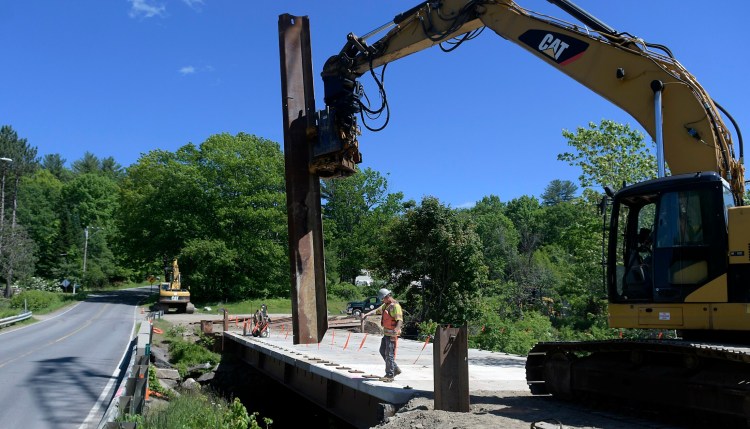The state’s top transportation official says next year’s entire highway repair program is at risk if lawmakers don’t return to Augusta in the next two weeks and vote to put a highway borrowing package on the November ballot.
“We normally bid out $350 million for just our core highway and bridge program; if we don’t get a bond, half of that could be gone,” said Maine Transportation Commissioner Bruce Van Note in an interview Tuesday.
“This bond is mission-critical,” Van Note added. “They have to do it this month or we are going to be in a world of hurt.”
In June, Gov. Janet Mills proposed borrowing $239 million over two years for economic development, environment and transportation programs. That proposal included a $105 million bond to fund work on highways, ports, rail and airports next year.
But lawmakers failed to pass the bond package before they adjourned in June, leaving state transportation planners and private contractors uncertain when, or if, the money will come through.
An Aug. 30 deadline to get bond language on the ballot looms and there’s still no date to reconvene the Legislature. That’s put transportation planners on edge as they start to prepare next year’s work plan.
The transportation bond is the latest in five consecutive years of state borrowing to shore up a chronically underfunded maintenance and repair program for Maine’s aging highways and bridges. The sale of state bonds is anticipated to fund 20 percent of the state’s highway program next year and provide critical matches for federal funding.
“Is this really the best way to fund transportation programs?” Van Note said. “I get why people say ‘why are we bonding all the time’ – right now we appear to be overly reliant on it.”
Mills is contemplating a special session to consider bonds near the end of August, but no firm date has been set, said spokeswoman Lindsay Crete.
“Gov. Mills is continuing to bring lawmakers together to pass a bond package that invests in our economy and addresses the most critical challenges facing our state,” Crete said in an email. “Gov. Mills believes strongly in sending a bond package that tackles these challenges head on to the Maine people for consideration in November.”
House Republicans support a vote on the transportation bond, but want to consider the rest of Mills’ package when lawmakers reconvene in January, said House Minority Leader Kathleen Dillingham, R-Oxford, in an interview. The same conflict sank bond issues in the final hours of the legislative session. General obligation bonds need two-thirds support in both houses of the Legislature and a majority vote by state voters.
“We fully support the transportation bond, especially the piece of it specifically for the road infrastructure and bridges,” Dillingham said.
Stakeholders on both side of the aisle believe lawmakers will eventually come back to settle the issue because the transportation funding question is too critical to ignore.
“We have to do something by the end of the month and I fully expect we will,” said Sen. Bill Diamond, D-Windham, Senate chairman of the Legislature’s Transportation Committee. “The crux of the matter is we need a transportation bond and both Republicans and Democrats agree to that.”
This is unfortunately a familiar situation, said Matt Marks, CEO of Associated General Contractors of Maine. The state’s reliance on annual bonding for highway funding makes it vulnerable to hiccups such as legislative delay and executive action. Bonds are also subject to voter approval, which has historically been overwhelming, but never guaranteed.
“What we put ourselves in is this ‘just in time’ thing which really doesn’t benefit the state or companies,” Marks said. “It is really just a lot of heartache all around.”
A conflict between former Gov. Paul LePage and Treasurer Terry Hayes in 2017 threatened to hold up the sale of transportation bonds and the former governor stalled on bond sales again last year.
That means construction companies can’t be sure of state highway contracts, making it a gamble to line up equipment and labor. For the state, delays mean pushing bidding further into the season and into heavier competition with public and private work. That’s amid skyrocketing construction prices that forced the state to cancel $59 million in highway projects this year.
“We are so far behind, we are passing this stuff literally months before they have to go out to bid,” Marks said.
“It is costing the state more to do it this way,” he added. “Why we decide to do this on an annual basis is beyond me.”
There is a consensus that Maine’s highway funding system needs serious reconsideration. Without bonding, the state would have an annual highway shortfall of about $160 million. The last time the gas tax was raised – the highway fund’s primary financing method – was in 2011. Years of proposals for new funding, from fees on electric vehicles, seasonal gas taxes or added fees and sales tax allotments, have gone nowhere.
A new bipartisan blue ribbon commission set up this year is expected to consider a full range of options to fund the highway program. It is supposed to submit a report and suggested legislation to the Legislature by early December.
Send questions/comments to the editors.




Comments are no longer available on this story